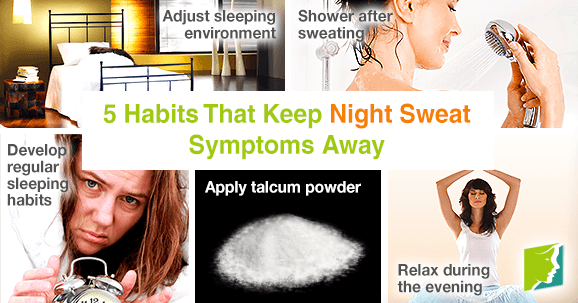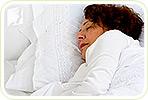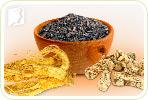Night sweats can be an irritating symptom during menopause. Awakening during the night to find oneself soaked with cold sweat is hardly a pleasant experience, and it is one that occurs regularly in perimenopausal women. Night sweats happen when hormonal imbalances trigger an increase in body temperature, to which the body responds by producing sweat to cool down. Sweating episodes can cause tiredness, irritability, and body odor, symptoms that are detrimental to well-being in various ways. Keep reading to learn some habits that can help keep these night sweat symptoms at bay.
Adjust Sleeping Environment
Daytime tiredness is among the most common of all night sweat symptoms, and almost certainly the most problematic. When night sweats consistently interrupt your sleeping routine, tiredness during the day is inevitable, and comes with irritability, reduced energy levels, and difficulty concentrating.
Keeping a cool sleeping environment is key to maintaining a consistent body temperature and enabling sound, sweat-free sleep. Avoid using central heating or heaping unnecessary blankets on your bed. Layer breathable cotton sheets and sleep with a window open to keep the room well-aired and conducive to restful sleep.
Shower After Sweating
Personal hygiene issues are among the most common of night sweat symptoms, because it's difficult for a person to detect their own odor. If you don't shower in the morning, sweat from the previous night may linger in your armpits and other sweat-prone areas and cause body odor. Showering every morning and having your armpits regularly can help to prevent odorous bacteria from accumulating as a result of sweating.
Apply Talcum Powder
Talcum powder has absorptive and astringent qualities, meaning it simultaneously suppresses and helps soak up sweating. Talc is also fragrant, so applying it to sweat-prone areas before going to bed can reduce body odor caused by sweats.
Develop Regular Sleeping Patterns
It can be difficult to achieve the recommended eight hours of sleep per night with the interruption of sweating episodes, but developing a regular sleeping pattern will help you to achieve deeper and more restful sleep. Try to go to bed and wake up at the same time every day, even on the weekends. This will enable restorative sleep and help prevent you from being woken up by sweating episodes, and it can ward off resulting tiredness and irritability the following day.
Relax during the Evening
Avoiding stimulants during the evening is a good way to promote deep sleep without interruption from night sweats. Dietary triggers, such as caffeine, alcohol and spicy foods, exacerbate night sweat symptoms by increasing internal activity for up to two hours after their consumption. Unwind in the evening with activities that promote relaxation, such as deep breathing and meditation.
At first, it may be difficult to adjust to these changes to your diet and lifestyle, but the initial adjustment period will pass as these changes become habitual. Once you notice a reduction in your night sweats symptoms and begin to experience the benefits of more restful, sweat-free sleep -- such as increased energy and concentration levels during the day -- these changes to your routine will seem a small and worthwhile sacrifice.
Sources
- Dall, L. & Stanford, J.F. (1990). Fever, Chills, and Night Sweats. In: Clinical Methods: The History, Physical, and Laboratory Examinations. 3rd ed. Retrieved from http://www.ncbi.nlm.nih.gov/books/NBK324/
- National Health Service UK. (2011). Night sweats. Retrieved April 4, 2014, from http://www.nhs.uk/conditions/night-sweats/Pages/Introduction.aspx
- Shenefelt, P.D. (2011). Herbal Treatment for Dermatologic Disorders. In: Biomolecular and Clinical Aspects. 2nd ed. Retrieved from http://www.ncbi.nlm.nih.gov/books/NBK92761/




